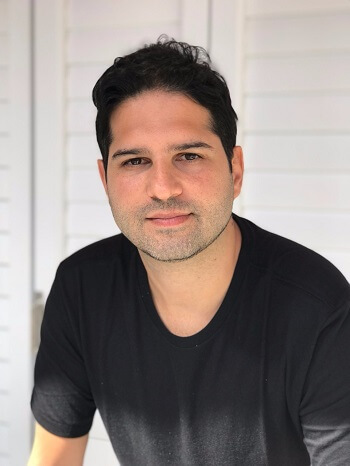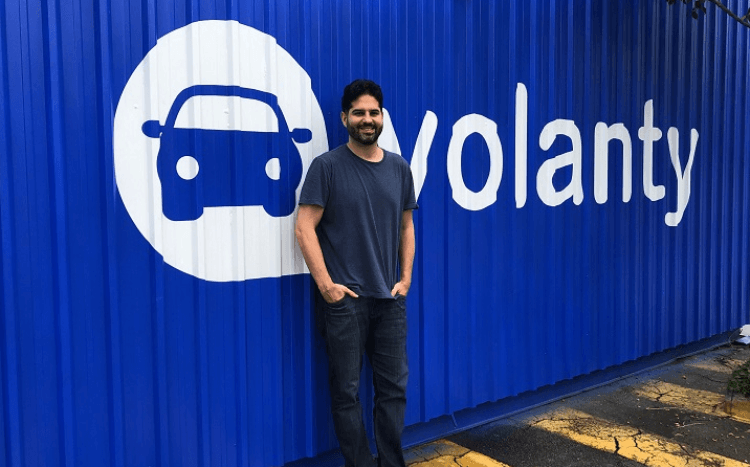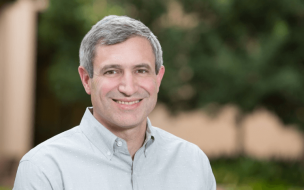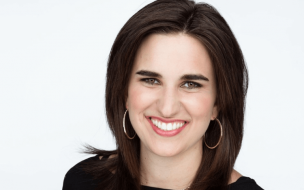Mauricio raised the biggest chunk of money a 2019 series B funding round—$18 million from SoftBank and Kaszek Ventures—which followed investments of $800,000 from Canary Capital and a handful of former Stanford MBAs in their seed round, and $5 million from Monashees Capital in their series A in 2018.
Today, Mauricio oversees a company made up of 150 employees in 15 locations, which helps sellers sell cars and buyers buy them online. The firm owns dealerships where vehicles are appraised, priced, photographed, documented and traded.
It wasn’t until Mauricio joined Stanford though, that he knew he wanted to launch his own startup. Before the MBA, he almost set out on a different path entirely.
Keeping it in the family
Mauricio’s parents moved to London when he was only nine months old—his father was a diplomat and had been stationed in the Brazilian embassy there.
Then when he was five, they moved to Brasilia, then Hong Kong when he was 10, and then back to Brazil, and Rio de Janeiro, when he was 14.
It was an international life, but one that confirmed he didn’t want to follow in his father’s footsteps and enter government or political life.
Instead he looked towards his mother and older brothers, who were embedded in the communications world. His mother was a journalist, one of his brothers is a sales director for Paramount Pictures, and his other sibling is a movie producer.

After a degree in communications, he began working for a media and entertainment startup, Esporte Interativo, in business development. His future career path soon became clear.
“I realised that I was much more passionate about creating value, building teams, and using new technology than working in the media industry,” Mauricio recalls.
“I noticed the other people in the company weren’t very ambitious—they were working with their hobby but lacking ambition. I knew I wanted to work with small companies where I could make an impact but stay away from media and entertainment.”
But there was a caveat. Mauricio explains that he felt stuck in the media and entertainment industry due to his professional experience and his university education.
An MBA wasn’t on the cards at this point. It took dinner with a friend who had just been accepted onto an MBA at Columbia to realize that business school was a realistic option.
It didn’t take long for Stanford to stand out as the clear winner for Mauricio. A single day of research and the ambition to move into tech meant the school became a no brainer.
“Stanford came out as not only the best school in world but they also teach you about technology, and it has the DNA of innovation that matches what I became passionate about at my previous job.”
The path to entrepreneurship
The first year of the MBA was all about academic growth, Mauricio says. He wanted to focus on getting the core business modules ingrained in his psyche, readying him for a life in business.
Then in his second year, he landed two summer internships. One with German venture capital company, Rocket Internet, in Sao Paulo, where he worked as a venture builder. And a second internship with a social media startup in New York.
That gave him the experience of the startup world that confirmed he wanted to launch his own business back in Brazil. Before he jumped into life as an entrepreneur though, Mauricio continued to build his professional experience after graduating, as a country manager for online ticket marketplace, Viagogo.
He launched the company’s Latin American operation from scratch. That meant further developing his ability to build a team, start a company, and build partnerships, all without the risk that accompanies a fledgling startup.
By the time he left three years later to start Volanty, Viagogo’s Brazilian market was in their top five markets globally.
“Once the market was established, my job became much more about meetings and calls with the New York office, rather than execution—that’s when I realized it was time to start my own thing.”
Launching Volanty
So, Mauricio had the skills, the ambition, and the connections. During his time at Stanford, he’d also began a little angel investing. He became quite active in the angel ecosystem in Brazil, and so knew what it was like to raise money and start something from scratch—he began searching for a cofounder.
A friend of his, Antonio Avellar, with whom Mauricio had gone through middle and high school, had graduated with an MBA from NYU Stern and was working for McKinsey in Brazil.
He didn’t see his future in consulting, and so after some persuasion from Mauricio, they drew up Volanty’s business plan together before Antonio left McKinsey.
Serendipitously, three other used car startups came out of Mauricio’s Stanford MBA class of 2013. Mauricio spoke with their founders regularly, discussing the latest innovations they were working on, and how their differing business models were working.
Antonio’s family had also worked in the auto industry for generations, so there was a list of contacts he and Mauricio could call on.
Everything comes back to that time at Stanford, Mauricio adds, and Volanty’s existence is testament to the MBA.
“I’m 100% sure Volanty would not exist if it wasn’t for Stanford,” he says. “When you spend time at Stanford they prove to you you’re good enough to change the world.
“The two years at Stanford made me realize that I’m much more worthy of impact than I thought. The world became something that you can actually change if you put your mind to it.”
And how has life been as an entrepreneur?
“I probably work twice or three times as much, but I’m 20 times happier. It’s worth the 24-hour days that happen sometimes, so I’m exhausted, but extremely happy.”







